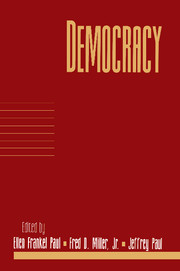Book contents
- Frontmatter
- Contents
- Introduction
- Acknowledgments
- Contributors
- The Very Idea of Popular Sovereignty: “We the People” Reconsidered
- Quasi-Rights: Participatory Citizenship and Negative Liberties in Democratic Athens
- Is There a Duty to Vote?
- Postmodern Liberalism and the Expressive Function of Law
- Democratic Epistemology and Accountability
- Political Quality
- Why Deliberative Democracy Is Different
- The Institutions of Deliberative Democracy
- Democracy as a Telos
- Radical Democracy, Personal Freedom, and the Transformative Potential of Politics
- Democracy and Value Pluralism
- The Problem of Russian Democracy: Can Russia Rise Again?
- Index
Democracy and Value Pluralism
Published online by Cambridge University Press: 03 May 2010
- Frontmatter
- Contents
- Introduction
- Acknowledgments
- Contributors
- The Very Idea of Popular Sovereignty: “We the People” Reconsidered
- Quasi-Rights: Participatory Citizenship and Negative Liberties in Democratic Athens
- Is There a Duty to Vote?
- Postmodern Liberalism and the Expressive Function of Law
- Democratic Epistemology and Accountability
- Political Quality
- Why Deliberative Democracy Is Different
- The Institutions of Deliberative Democracy
- Democracy as a Telos
- Radical Democracy, Personal Freedom, and the Transformative Potential of Politics
- Democracy and Value Pluralism
- The Problem of Russian Democracy: Can Russia Rise Again?
- Index
Summary
INTRODUCTION
My intention in this essay is to open up a question I cannot fully resolve: the relationship between democracy and value pluralism. By “value pluralism” I mean the view propounded so memorably by the late Isaiah Berlin and developed in various ways by thinkers including Stuart Hampshire, Steven Lukes, Thomas Nagel, Martha Nussbaum, Michael Stocker, Bernard Williams, Charles Taylor, John Kekes, and John Gray, among others. I shall define and discuss this view in some detail in Section III. For now, suffice it to say that value pluralism is the view that what we (rightly) value in our lives turns out to be multiple, heterogeneous, not reducible to a common measure, and not hierarchically ordered with a single dominant value or set of values binding on all persons in all circumstances. I use the phrase “value pluralism” rather than “moral pluralism” to indicate that this view encompasses nonmoral as well as moral goods.
My overall thesis is this: If there are good reasons to take value pluralism seriously (and I believe there are), then it becomes impossible to accord democracy normative authority over all other claims, public and nonpublic. Not only is the scope of democratic political authority restricted; certain alternatives to democracy within the sphere of politics must be taken more seriously than they usually are.
- Type
- Chapter
- Information
- Democracy , pp. 255 - 268Publisher: Cambridge University PressPrint publication year: 2000



